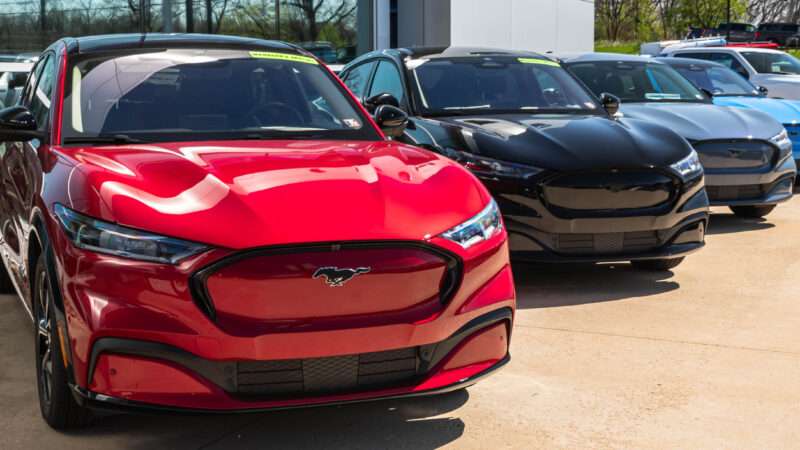
One of the country's largest automakers announced this week that it was shifting its focus away from battery-powered electric vehicles (E.V.s) in favor of hybrids that still use some amount of gasoline. The decision to prioritize a transitional technology makes sense, even though federal regulators might not be happy.
Ford Motor Co. CFO John Lawler told journalists Wednesday that the company would be shifting its focus away from all-electric vehicles. This included scrapping an electric three-row SUV previously planned for release in 2025.
The decision marks a major shift in the company's priorities. Two years ago, the automaker restructured, cleaving its production line into two divisions: Ford Blue, which would continue to make traditional vehicles with internal combustion engines, and Ford Model e, which would make its growing line of E.V.s.
Ford has seen strong E.V. sales: In the second quarter of 2024, its Mustang Mach-E and F-150 Lightning recorded respective year-over-year sales growth of 58 percent and 79 percent.
But it hasn't been all upside: The Model e division recorded losses of $1.3 billion in the first quarter of this year, averaging out to a staggering $132,000 loss per vehicle. For context, a fully loaded F-150 Lightning costs less than $100,000. The division also lost another $1.3 billion in the third quarter of 2023, which it attributed in part to "challenging market dynamics."
Instead, the company is prioritizing vehicles it thinks can sell more easily. "We're committed to creating long-term value by building a competitive and profitable business," Lawler said in a press release, focusing on vehicle models that could become profitable "within the first 12 months of launch."
Ford will continue to produce the Mach-E and F-150 Lightning, but Lawler indicated the company will begin to prioritize hybrids, which use both gas and electric motors.
"When you look at the three-row SUV, hybrid technologies or multiple propulsion technologies, for those customers, is the best solution," Lawler said.
The scenario seems like a win-win: As Americans remain hesitant to embrace an entirely gasoline-free future, hybrids offer a feasible compromise, using less gas and emitting fewer carbon emissions while still being able to take long trips when necessary.
Toyota charted a similar path, remaining focused on hybrids while other automakers embraced E.V.s wholeheartedly. Then, as demand for all-electric vehicles cooled, Toyota reaped the rewards: Just six months after The New York Times wrote that the Japanese automaker "struggles to master electric vehicles," the same paper noted that "Toyota's hybrid-first strategy is delivering big profits."
Unfortunately, federal regulations adopted this year by the Environmental Protection Agency (EPA) could complicate the switch.
In March, the EPA released rules that would cut the number of new gas-burning vehicles on the road over the next decade. Under its "more stringent emissions standards" for consumer vehicles, the agency foresaw that by 2032, 56 percent of all new vehicles on the road would be electric, while only 16 percent would be hybrids.
The National Automobile Dealers Association called the rule "flawed," as "other market conditions to make EVs broadly attractive to consumers…simply do not yet exist." It cited "vehicle affordability, a sufficient and reliable charging infrastructure, and acceptable charging speeds" as obstacles to widespread acceptance.
Besides, the EPA rule disincentivizes hybrids, needlessly forestalling a feasible transition between gas and electricity.
"We're in a transitional moment," ecologist Andrew Thaler wrote in July. "Not everywhere has the infrastructure to support full electric vehicles, and we don't yet have an electric vehicle for every use case. In a moment where many EV drivers continue to maintain a secondary gas car for longer trips, having one vehicle that does both is an opportunity." Thaler advises environmentalists, "Don't let the perfect be the enemy of the good."
Ford's decision to refocus on hybrids is not without its own costs—the company noted in its press release that by canceling the electric three-row SUV, it would write down "about $400 million" on the lost time and resources, which "may also result in additional expenses and cash expenditures of up to $1.5 billion."
But importantly, it's Ford's decision based on changing consumer demand. Switching to cleaner forms of transportation is one of the easiest ways to cut down on our carbon emissions, and the market has spoken: People prefer hybrids to all-electric vehicles. And yet, as usual, government regulators are stuck trying to mandate something for which the demand simply isn't there.
The post Ford Wants To Build Hybrids Instead of All-Electric Cars. The EPA Hates That. appeared first on Reason.com.







